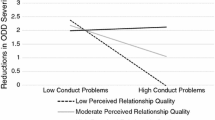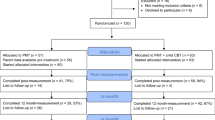Abstract
Parent management training (PMT) is considered a best-practice for treating childhood ADHD. However, the magnitude of change in response to PMT differs across individuals. This study examined comorbid oppositional symptoms as a predictor of ADHD treatment outcomes. We predicted children with more severe baseline oppositionality would exhibit greater improvements in externalizing behaviors overall, including core ADHD symptoms. Participants consisted of 67 children aged 7–10 diagnosed with ADHD-Combined Type. Participants and their families received a manualized ten-session intervention, Family Skills Training for ADHD-Related Symptoms (Family STARS), combining PMT with a simultaneously occurring child skills training intervention. Pre- and post-treatment parent and teacher rating scales were collected to assess changes in ADHD and oppositional symptoms. Results demonstrated that children with more severe ratings of oppositional behaviors achieved commensurate ADHD symptom outcomes compared to those with less severe oppositionality. Implications are discussed with regard to the utilization of ADHD impairment-specific treatment targets.
Similar content being viewed by others
References
Evans SW, Owens JS, Bunford N (2014) Evidence-based psychosocial treatments for children and adolescents with attention-deficit/hyperactivity disorder. J Clin Child Adolesc Psychol 43:527–551
Fabiano GA, Pelham WE, Coles EK, Gnagy EM, Chronis-Tuscano A, O’Connor BC (2009) A meta-analysis of behavioral treatments for attention-deficit/hyperactivity disorder. Clin Psychol Rev 29:129–140
Chacko A, Allan CC, Uderman J, Cornwell M, Anderson L, Chimklis A (2015) Training parents of youth with ADHD. In: Barkley RA (ed) Attention-deficit hyperactivity disorder: a handbook for diagnosis and treatment, 4th edn. Guilford, New York, pp 513–536
Chacko A, Jensen SA, Lowry LS, Cornwell M, Chimklis A, Chan E et al (2016) Engagement in behavioral parent training: review of the literature and implications for practice. Clin Child Fam Psychol Rev 19:204–215
Hinshaw SP (2007) Moderators and mediators of treatment outcome for youth with ADHD: understanding for whom and how interventions work. J Pediatr Psychol 32:664–675
Nock MK, Ferriter C (2005) Parent management of attendance and adherence in child and adolescent therapy: a conceptual and empirical review. Clin Child Fam Psychol Rev 8:149–166
Nix RL, Bierman KL, McMahon RJ, The Conduct Problems Prevention Research Group (2009) How attendance and quality of participation affect treatment response to parent management training. J Consult Clin Psychol 77:429–438
Kazdin AE, Whitley MK (2006) Comorbidity, case complexity, and effects of evidence-based treatment for children referred for disruptive behavior. J Consult Clin Psychol 74:455–467
Kolko DJ, Pardini DA (2010) ODD dimensions, ADHD, and callous—unemotional traits as predictors of treatment response in children with disruptive behavior disorders. J Abnorm Psychol 119:713–725
Masi G, Muratori P, Manfredi A, Lenzi F, Polidor L, Ruglioni L et al (2013) Response to treatments in youth with disruptive behavior disorders. Compr Psychiatry 54:1009–1015
Plizka SR (2015) Comorbid psychiatric disorders in children with ADHD. In: Barkley RA (ed) Attention-deficit hyperactivity disorder: a handbook for diagnosis and treatment, 4th edn. Guilford, New York, pp 140–168
Barkley RA (2015) Emotion dysregulation is a core component of ADHD. In: Barkley RA (ed) Attention-deficit hyperactivity disorder: a handbook for diagnosis and treatment, 4th edn. Guilford, New York, pp 81–115
Martel MM (2009) Research review: a new perspective on attention-deficit/hyperactivity disorder: emotion dysregulation and trait models. J Child Psychol Psychiatry 50:1042–1051
Johnston C, Chronis-Tuscano A (2014) Families and ADHD. In: Barkley RA (ed) Attention-deficit hyperactivity disorder: a handbook for diagnosis and treatment, 4th edn. Guilford, New York, pp 191–209
Jensen PS, Martin D, Cantwell DP (1997) Comorbidity in ADHD: Implications for research, practice, and DSM-V. J Am Acad Child Adolesc Psychiatry 36:1065–1079
Kazdin AE, Crowley M (1997) Moderators of treatment outcome in cognitively based treatment of antisocial children. Cogn Ther Res 21:185–207
MTA Cooperative Group (1999) Moderators and mediators of treatment response for children with attention-deficit/hyperactivity disorder: The Multimodal treatment study of children with attention-deficit/hyperactivity disorder. Arch Gen Psychiatry 56:1088–1096
Jarrett M, Siddiqui S, Lochman J, Qu L (2014) Internalizing problems as a predictor of change in externalizing problems in at-risk youth. J Clin Child Adolesc Psychol 43:27–35
Weiss B, Harris V, Catron T, Han SS (2003) Efficacy of the RECAP intervention program for children with concurrent internalizing and externalizing problems. J Consult Clin Psychol 71:364–374
Ollendick T, Jarrett M, Grillstaquechel A, Hovey L, Wolff J (2008) Comorbidity as a predictor and moderator of treatment outcome in youth with anxiety, affective, attention deficit/hyperactivity disorder, and oppositional/conduct disorders. Clin Psychol Rev 28:1447–1471
Jensen PS, Arnold LE, Swanson JM, Vitiello B, Abikoff HB, Greenhill LL et al (2007) 3-year follow-up of the NIMH MTA study. J Am Acad Child Adolesc Psychiatry 46:989–1002
Aitken M, Waxman JA, MacDonald K, Andrade BF (2018) Effect of comorbid psychopathology and conduct problem severity on response to a multi-component intervention for childhood disruptive behavior. Child Psychiatry Hum Dev 49:853–864
Bjørnebekk G, Kjøbli J, Ogden T (2015) Children with conduct problems and co-occurring ADHD: behavioral improvements following parent management training. Child Fam Behav Ther 37:1–19
Leijten P, Raaijmakers M, Wijngaards L, Matthys W, Menting A, Hemink-van Putten M et al (2018) Understanding who benefits from parenting interventions for children’s conduct problems: an integrative data analysis. Prev Sci 19:579–588
Costin J, Chambers SM (2007) Parent management training as a treatment for children with oppositional defiant disorder referred to a mental health clinic. Clin Child Psychol Psychiatry 12:511–524
Hartman RR, Stage SA, Webster-Stratton C (2003) A growth curve analysis of parent training outcomes: examining the influence of child risk factors (inattention, impulsivity, and hyperactivity problems), parental and family risk factors. J Child Psychol Psychiatry 44:388–398
van den Hoofdakker BJ, van der Veen-Mulders L, Sytema S, Emmelkamp PMG, Minderaa RB, Nauta MH (2007) Effectiveness of behavioral parent training for children with adhd in routine clinical practice: a randomized controlled study. J Am Acad Child Adolesc Psychiatry 46:1263–1271
Kaminski JW, Claussen AH (2017) Evidence base update for psychosocial treatments for disruptive behaviors in children. J Clin Child Adolesc Psychol 46:477–499
American Psychiatric Association (2013) Diagnostic and statistical manual of mental disorders: DSM-5, 5th edn. American Psychiatric Association, Washington, D.C.
Barkley RA, Murphy KR (2006) Attention-deficit hyperactivity disorder: a clinical workbook, 3rd edn. Guilford Press, New York
DuPaul GJ, Power TJ, Anastopoulos AD, Reid R (1998) ADHD rating scale-IV: checklists, norms, and clinical interpretation. Guilford Press, New York
DuPaul GJ, Power TJ, McGoey KE, Ikeda MJ, Anastopoulos AD (1998) Reliability and validity of parent and teacher ratings of attention-deficit/hyperactivity disorder symptoms. J Psychoeduc Assess 16:55–68
Reynolds C, Kamphaus R (2004) The behavior assessment system for children-second edition (BASC-2) Manual. AGS Publishing, Minnesota
Curtis DF (2010) ADHD symptom severity following participation in a pilot, 10-week, manualized, family-based behavioral intervention. Child Fam Behav Ther 32:231–241
Ferguson CJ (2009) An effect size primer: a guide for clinicians and researchers. Prof Psychol 40:532–538
Faul F, Erdfelder E, Lang A-G, Buchner A (2007) G*Power 3: a flexible statistical power analysis program for the social, behavioral, and biomedical sciences. Behav Res Methods 39:175–191
McNeil CB, Hembree-Kigin TL, Anhalt K, Hembree-Kigin TL (2010) Parent-child interaction therapy, 2nd edn. Springer Verlag, New York
Sanders MR, Kirby JN, Tellegen CL, Day JJ (2014) The Triple P-Positive Parenting Program: a systematic review and meta-analysis of a multi-level system of parenting support. Clin Psychol Rev 34:337–357
McMahon RJ, Forehand RL (2003) Helping the noncompliant child: family-based treatment for oppositional behavior, 2nd edn. Guilford Press, New York
Curtis DF, Heath CL, Chapman SG, Elkins SR (2013) Family skills training intervention for ADHD: Putting the child back into child therapy. J Psychol Abnorm Child 1:1–7
Funding
This project was supported by internal funding for patient care by the Psychology Service at Texas Children’s Hospital. (PI: Curtis).
Author information
Authors and Affiliations
Corresponding author
Ethics declarations
Conflicts of interest
On behalf of all authors, the corresponding author declares no conflicts of interest.
Research Involving Human Participants and/or Animals
All procedures performed in studies involving human participants were in accordance with the ethical standards of the Institutional and/or National Research Committee and with the 1964 Helsinki declaration and its later amendments or comparable ethical standards.
Informed Consent
Informed consent was obtained from all individual participants included in the study.
Additional information
Publisher's Note
Springer Nature remains neutral with regard to jurisdictional claims in published maps and institutional affiliations.
Rights and permissions
About this article
Cite this article
Elkins, S.R., Bond, M.A. & Curtis, D.F. Do Comorbid Oppositional Symptoms Predict ADHD Behavioral Treatment Outcomes?. Child Psychiatry Hum Dev 50, 918–926 (2019). https://doi.org/10.1007/s10578-019-00894-5
Published:
Issue Date:
DOI: https://doi.org/10.1007/s10578-019-00894-5




